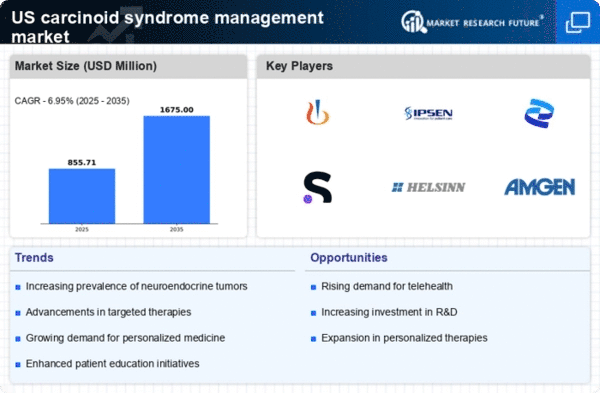Increased Research Funding
The carcinoid syndrome-management market is benefiting from increased research funding aimed at understanding neuroendocrine tumors and their management. Government and private organizations are allocating more resources to research initiatives, which is likely to lead to the development of novel therapies and management strategies. For instance, the National Institutes of Health (NIH) has reported a rise in funding for cancer research, including studies focused on carcinoid syndrome. This influx of financial support may accelerate the discovery of new treatment modalities, enhancing the overall management landscape for patients. As research progresses, the carcinoid syndrome-management market could see a surge in innovative products and services designed to improve patient care and outcomes.
Expansion of Supportive Care Services
The expansion of supportive care services is playing a crucial role in the carcinoid syndrome-management market. As healthcare providers recognize the importance of holistic patient care, there is a growing emphasis on integrating supportive services such as nutritional counseling, pain management, and psychological support into treatment plans. This comprehensive approach not only addresses the physical symptoms of carcinoid syndrome but also enhances the overall quality of life for patients. The increasing availability of these services is likely to drive demand within the carcinoid syndrome-management market, as patients and healthcare providers seek to optimize treatment outcomes. Furthermore, the collaboration between oncologists and supportive care specialists may lead to more effective management strategies tailored to individual patient needs.
Advancements in Diagnostic Technologies
Recent advancements in diagnostic technologies are significantly impacting the carcinoid syndrome-management market. Enhanced imaging techniques, such as PET scans and MRI, allow for earlier and more accurate detection of carcinoid tumors. Furthermore, the development of blood tests that measure biomarkers associated with neuroendocrine tumors has improved diagnostic accuracy. These innovations not only facilitate timely intervention but also contribute to better patient outcomes. As diagnostic capabilities improve, the carcinoid syndrome-management market is likely to experience growth, as healthcare providers can offer more effective treatment plans based on precise diagnoses. The integration of these technologies into clinical practice is expected to drive demand for management solutions tailored to the unique needs of patients with carcinoid syndrome.
Growing Demand for Personalized Medicine
The shift towards personalized medicine is a notable driver in the carcinoid syndrome-management market. Patients are increasingly seeking tailored treatment options that consider their unique genetic profiles and tumor characteristics. This trend is prompting pharmaceutical companies to invest in the development of targeted therapies that specifically address the needs of individuals with carcinoid syndrome. As a result, the market is likely to witness a rise in the availability of personalized treatment plans, which may improve patient adherence and outcomes. The emphasis on personalized medicine aligns with broader healthcare trends, suggesting that the carcinoid syndrome-management market will continue to evolve in response to patient preferences and advancements in medical science.
Rising Incidence of Neuroendocrine Tumors
The increasing incidence of neuroendocrine tumors (NETs) in the US is a primary driver for the carcinoid syndrome-management market. According to the National Cancer Institute, the estimated annual incidence of NETs has been rising, with approximately 12,000 new cases reported each year. This trend suggests a growing patient population requiring effective management strategies for carcinoid syndrome. As awareness of these tumors increases, healthcare providers are more likely to diagnose carcinoid syndrome earlier, leading to a higher demand for treatment options. Thus, the carcinoid syndrome-management market is positioned to expand as pharmaceutical companies and healthcare providers focus on developing targeted therapies and supportive care solutions tailored to this specific patient demographic.























Leave a Comment